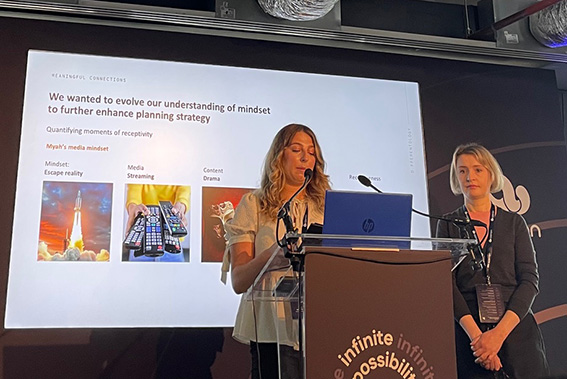|
Maria Iu
Consumers seeking comfort online more likely to view advertising positively


People wanting to improve their mood or find comfort when they go online are almost twice as likely to regard advertising as a positive experience than those who go online to relax or have me-time.
Those are some of the findings from a new study, commissioned by GroupM media agency Mindshare and Azerion and conducted by Differentology, that aims to better understand consumers’ mindsets when they are online and whether mindsets affect their receptivity to advertising.
It found that two-fifths of people looking to challenge themselves online will act on advertising, compared with 20% of those who are looking to fill time.
Meanwhile, one-third of people who are looking to find excitement online can recall seeing advertising — double those looking to relax.
The Meaningful Connections report was presented at Azerion’s Infinite Possibilities event in London on Thursday.
The study developed a Communication Receptivity (Core) Index to evaluate the mindsets in which people viewed media.
In general, it found that the “best” mindsets when it comes to receptivity are when people look for inspiration, seek excitement, challenge themselves or give something back as they are online.
Based on six metrics (emotion, relevance, intent, focus, visibility and experience), the Core Index aims to function as a strategic media planning tool that seeks to shift away from a traditional demographics-based approach to audience-targeting.
The goal is to allow brands to identify the content, channel and timing that will be most effective by analysing the different states of mind consumers are in online, and how these relate to their perception of advertising.
“There’s a balance to be struck between reach and receptivity,” according to Oksana Uustalu, associate director at Differentology. “What we also need to be conscious of is what different mindsets are better-suited to.”
For example, higher receptive mindsets could be leveraged by brands offering a more complex narrative in their advertising, while lower receptivity would be better-suited to building awareness.
Meaningful Connections is the next step in a previous study by Mindshare, Media Mindsets, released in August 2023. That research similarly sought to gain insights into how the content people watch is influenced by their mindset.
The latest research identified 16 mindsets in which people consume media:
• Be informed and up to date
• Improve mood
• Indulge
• Find inspiration
• Take some me-time
• Connect or socialise
• Escape reality
• Challenge oneself
• Relax and de-stress
• Find comfort
• Learn something
• Give back to the planet or others
• Fill time
• Have fun
• Find excitement
• Explore a topic in-depth
As Roxanne Harley, head of growth at Azerion, pointed out, “reach does not equal engagement”.
Rachel Cunliffe, research and insights account director at Mindshare, added: “A brand’s target audience cannot be treated as a homogenous group — how receptive they are to advertising messages will vary depending on the emotional and psychological needs of each individual, with these continually shifting over time.
“Our research focuses on understanding people’s need states as the key to reaching them with ads that resonate, rather than feeling intrusive and irrelevant. By quantifying receptivity, we can deliver an advertising experience that feels authentic, relevant and aligns with the consumers’ current mindset.”
The study involved a nationally representative sample of 3,948 people in the UK and evaluated over 10,000 media and mindset “occasions” including on streaming services and commercial radio.
